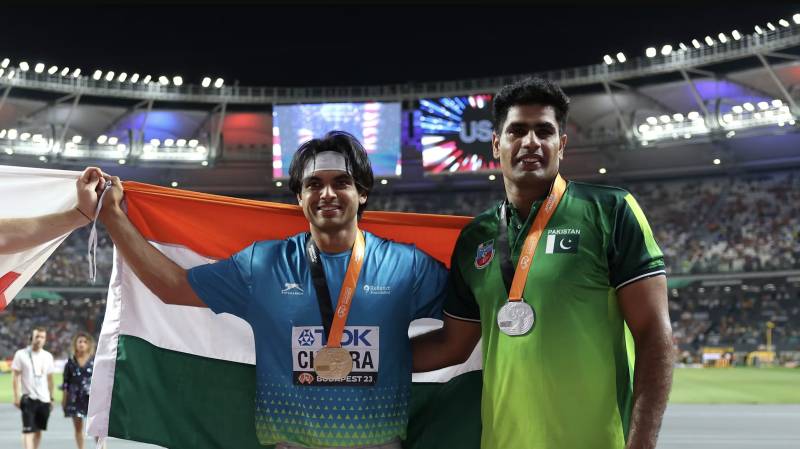
“The only bond worth anything between human beings is their humanness.”—Jesse Owens
Arshad Nadeem has made us proud by bagging the only gold medal for Pakistan in the Paris Olympics 2024 by throwing a javelin for a distance of 92.97 meters, thus setting a new Olympics record. Hailing from a poor family from Mian Channu, this son of the soil has hardly had any support from official sources. He practiced using hand-made weights and javelins that he cut out for himself because his family’s paltry income did not allow him to purchase Olympic javelins that cost Rs. 85,000. According to his father, Muhammad Ashraf, fellow villagers and relatives would donate money so that he could travel to other cities for his training and events in his early days. Running in futility from pillar to post for sponsorship to participate in 2024 Olympics, the only institute that came to his rescue was Pakistan Cricket Board that generates its own funds and is not supported either by the federal or provincial government.
Another noticeable fact is that Arshad is being coached by Salman Fayyaz Butt, perhaps the only person who saw the young man’s potential and had faith in his talent. The dedication with which the champion worked day and night to pursue his passion was also shared by his coach who stood by him with steadfast resolve. It is a pity that due to scanty funds Arshad was unable to participate and hoist the country’s flag in the closing ceremony on 11 August 2024 as he had to return immediately the day after winning the gold medal. At home, what an unceremonious departure like a common traveler for the games but what an extraordinary welcome on arrival! After a long break the people of this country—no—the people of this region, rejoiced unanimously, setting aside all their differences with one getting the gold and Neeraj Chopra on the other side of the border, getting a silver.
Neeraj Chopra won the gold in 2020 Olympics in Tokyo, Japan when he was merely 22 years of age. Arshad and Neeraj first confronted one another in 2016 in Gawahati, India and later on in 2020 in Tokyo where Arshad came in the fifth spot, but was all praises for the champion. They developed a strong friendship, where Neeraj actually went on to silence rumour-mongers who tried to create a rift between the two on the basis of an incident in Tokyo where Arshad inadvertently took his rival’s javelin, but returned immediately when made aware.
Responding to allegations of Arshad’s attempts to sabotage India, Neeraj tweeted: “I would request everyone to please not use me and my comments as a medium to further your vested interests and propaganda. Sports teach us to be together and united. I’m extremely disappointed to see some of the reactions from the public to my recent comments.” He has been supportive of his rival and was instrumental in making public appeals in March 2024 in vain to help Arshad obtain a new javelin.
Not only the athletes, but even their mothers Saroj Devi and Razia Parveen have shown mutual respect and love for one another’s offspring when the former expressed her happiness in Arshad’s achievement saying that both were her sons, that there was no difference between them and it was a proud moment for one to get gold and the other a silver; while the latter went on to say that both Neeraj and Arshad were not just friends but were brothers, that winning and losing was just part of games and she prayed that Neeraj be blessed with lots of success and more medals in the future.
Once again human bond has risen above all nationalities and proved beyond doubt that if there is one cementing element in this extremely disunited world, it is only humanity. A cursory look at any uninhabited planet shows no signs of artificial demarcations or conspicuous divisions but the relief of our most beautiful planet has man-made fences separating different territories, called countries meaning thereby that not nature but humans are the divisive forces that have separated the peoples of this world into various sections.
The infamous caste system for which Hinduism is apparently responsible although many cultures too have it in one form or the other, has seeped into these divisions in the form of First World, Second World and Third World where the inhabitants are considered civilized or uncultured on the basis of their residence.
However, by their very nature humans are generally kindhearted, social and peaceful, particularly the females in this group. As we moved through the corridors of time, society took on a patriarchal character where women were reduced to a secondary degree having little or no control over major decisions. Consequently, the earth has had to suffer tremendously at the hands of her assertive, violent and aggressive sons tearing apart her serenity, causing her denizens to lose their loved ones and even their own lives.
Where there is so much animosity, brutality, warfare, intolerance, hatred, unnatural divisions, poverty, starvation, racial discrimination—long stream of negativities—a few moments of goodwill become harbinger of the possibility of opening new portals of hope for humanity. These brief yet compassionate cross-border exchange of maternal words of love have raised anticipations of a more soft and sensible approach to improving neighborly relations. Those who say that people desiring peace and prosperity in this region should get Indian nationality must have the malevolent characteristics that have been destroying mother earth who is looking towards human mothers to heal this world.
“When you look into your mother’s eyes, you know that is the purest love you can find on this earth.”— Mitch Albom

